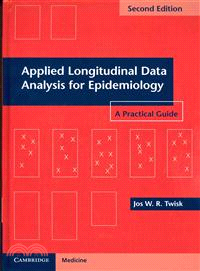 資料來源:
三民書局
資料來源:
三民書局
Applied longitudinal data analysis for epidemiology : a practical guide / Jos W.R. Twisk
- 作者: Twisk, Jos W. R. 1962-
- 出版: Cambridge ;New York : Cambridge University Press 2013
- 叢書名: Cambridge medicine
- 主題: Epidemiology--Research--Statistical methods , Epidemiology. , Epidemiology--Statistical methods. , Epidemiologic Studies. , Data Interpretation, Statistical. , Longitudinal Studies. , Models, Statistical.
- 版本:2nd ed.
- ISBN: 9781107030039 (hbk.) :: US$130.00 、 110703003X (hbk.) 、 9781107699922 (pbk.) 、 1107699924 (pbk.)
- 一般註:Previous edition: 2003 Includes bibliographical references (p. 305-315) and index
-
讀者標籤:
- 系統號: 005206895 | 機讀編目格式
館藏資訊

This book discusses the most important techniques available for longitudinal data analysis, from simple techniques such as the paired t-test and summary statistics, to more sophisticated ones such as generalized estimating of equations and mixed model analysis. A distinction is made between longitudinal analysis with continuous, dichotomous and categorical outcome variables. The emphasis of the discussion lies in the interpretation and comparison of the results of the different techniques. The second edition includes new chapters on the role of the time variable and presents new features of longitudinal data analysis. Explanations have been clarified where necessary and several chapters have been completely rewritten. The analysis of data from experimental studies and the problem of missing data in longitudinal studies are discussed. Finally, an extensive overview and comparison of different software packages is provided. This practical guide is essential for non-statisticians and rese
摘要註
"This book discusses the most important techniques available for longitudinal data analysis, from simple techniques such as the paired t-test and summary statistics, to more sophisticated ones such as generalized estimating of equations and mixed model analysis. A distinction is made between longitudinal analysis with continuous, dichotomous and categorical outcome variables. The emphasis of the discussion lies in the interpretation and comparison of the results of the different techniques. The second edition includes new chapters on the role of the time variable and presents new features of longitudinal data analysis. Explanations have been clarified where necessary and several chapters have been completely rewritten. The analysis of data from experimental studies and the problem of missing data in longitudinal studies are discussed. Finally, an extensive overview and comparison of different software packages is provided. This practical guide is essential for non-statisticians and researchers working with longitudinal data from epidemiological and clinical studies"-- "The emphasis of this book lies more on the application of statistical techniques for longitudinal data analysis and not so much on the mathematical background. In most other books on the topic of longitudinal data analysis, the mathematical background is the major issue, which may not be surprising since (nearly) all the books on this topic have been written by statisticians. Although statisticians fully understand the difficult mathematical material underlying longitudinal data analysis, they often have difficulty in explaining this complex material in a way that is understandable for the researchers who have to use the technique or interpret the results. Therefore, this book is not written by a statistician, but by an epidemiologist. In fact, an epidemiologist is not primarily interested in the basic (difficult) mathematical background of the statistical methods, but in finding the answer to a specific research question; the epidemiologist wants to know how to apply a statistical technique and how to interpret the results. Owing to their different basic interests and different level of thinking, communication problems between statisticians and epidemiologists are quite common. This, in addition to the growing interest in longitudinal studies, initiated the writing of this book: a book on longitudinal data analysis, which is especially suitable for the "non-statistical" researcher (e.g. the epidemiologist). The aim of this book is to provide a practical guide on how to handle epidemiological data from longitudinal studies"--Provided by publisher